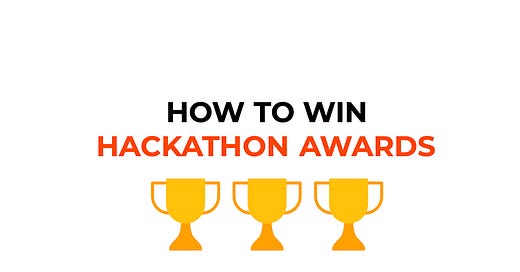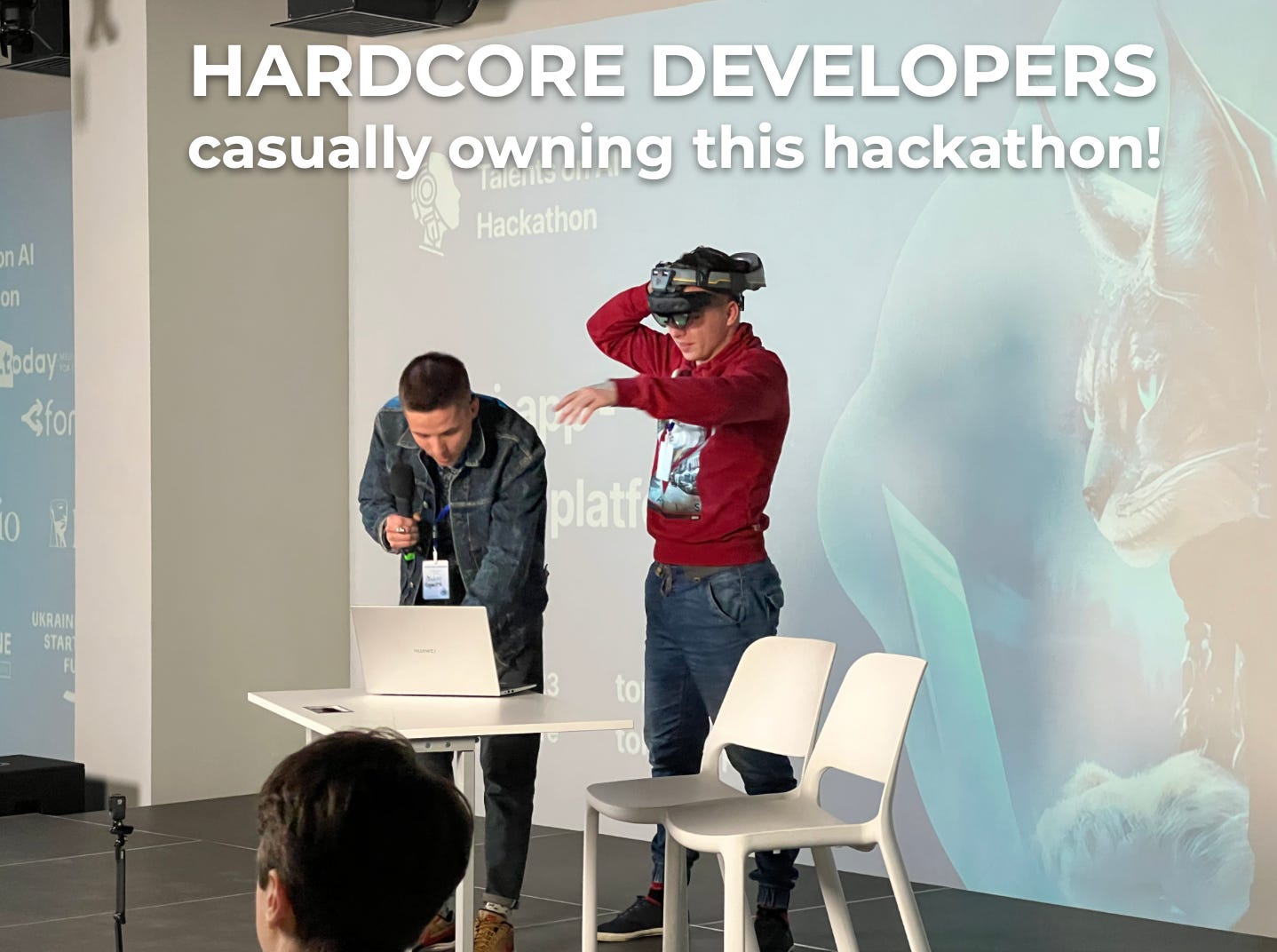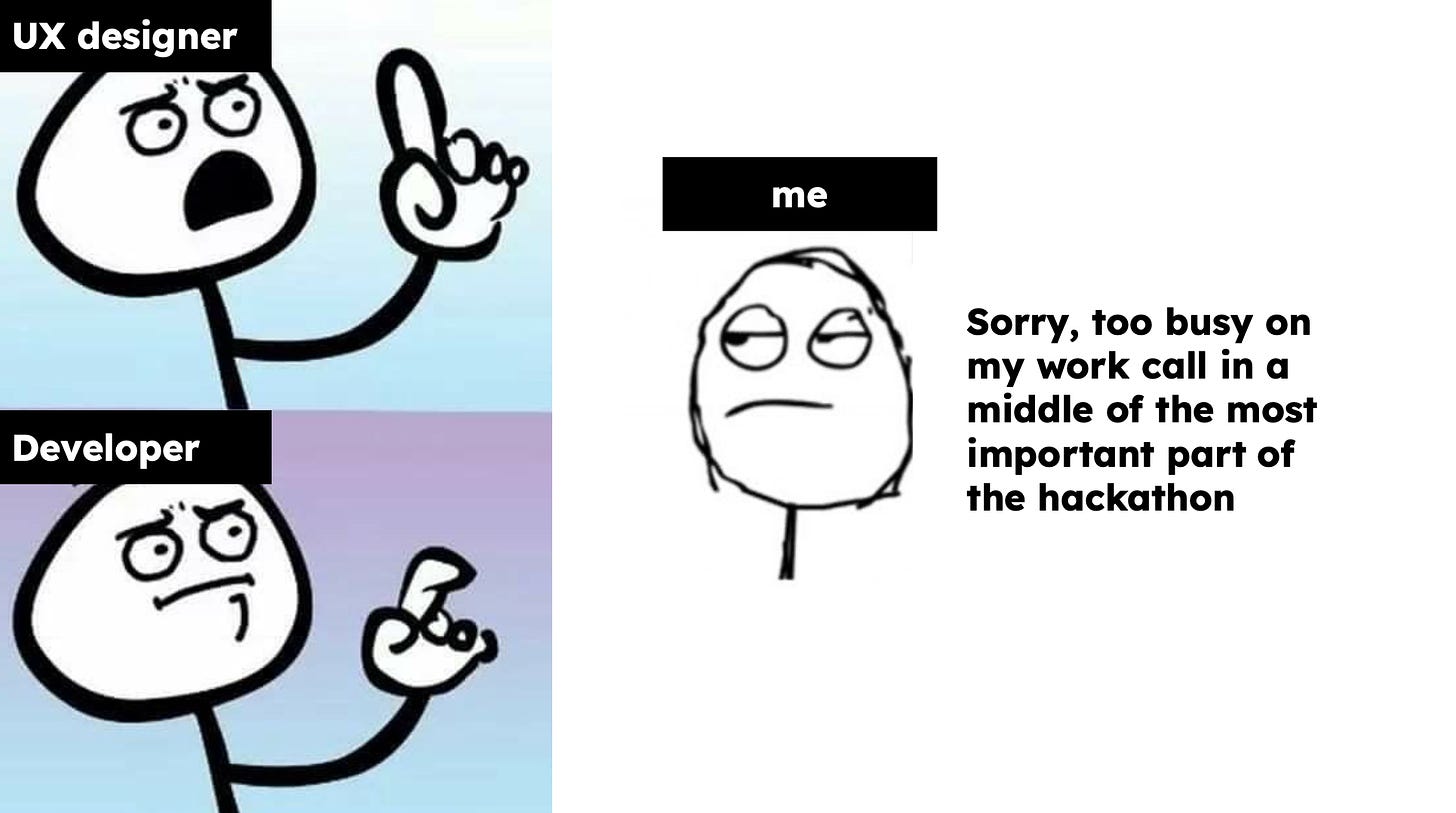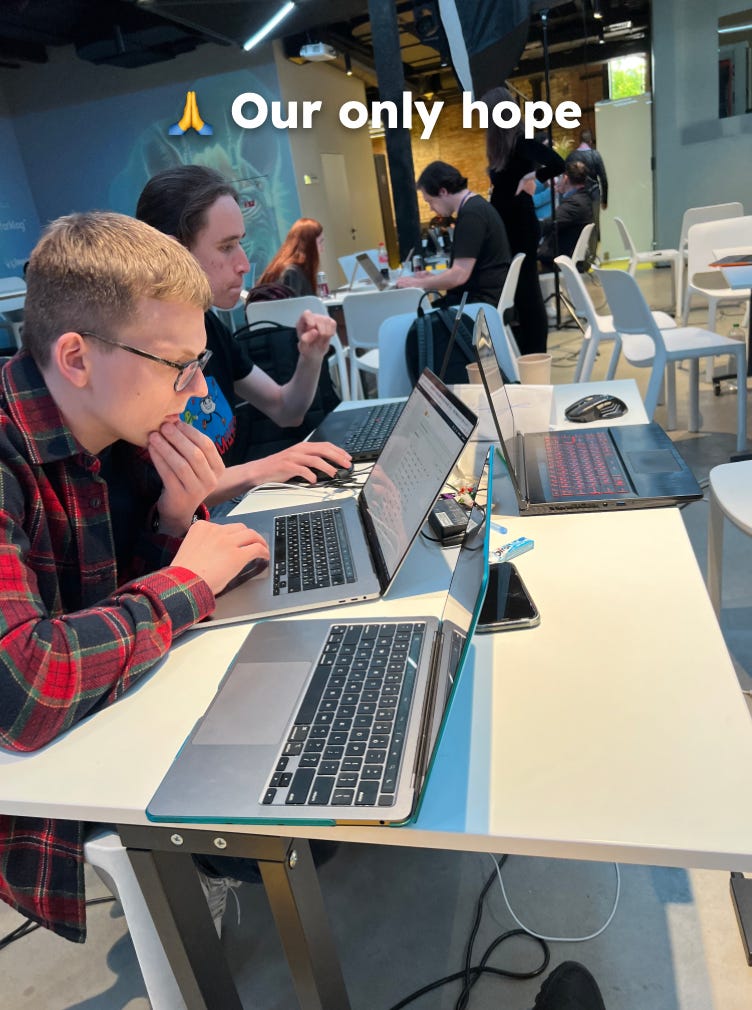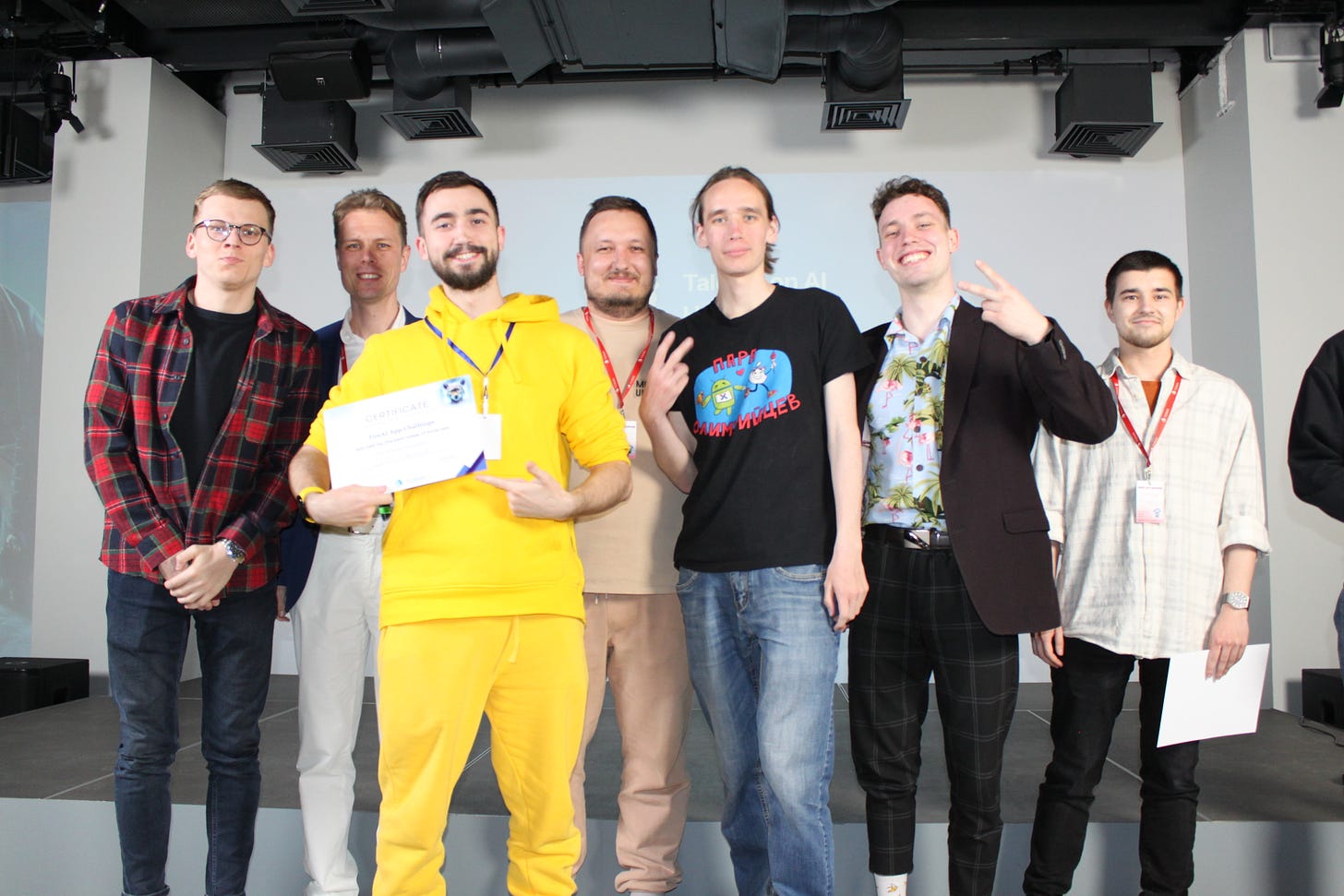
Are hackathons for hardcore developers?
I had no clue what hackathons were until I attended one.
In the back of my mind, I imagined diehard developers gathering to compete in teams.
Sort of video game tournaments where instead of games there’s software.
Looking back, damn was I delusional about this!
Actually participating in it has busted my personal myths:
hackathons are only for developers
hackathons are just contests
Turns out, hackathons are cradles for startups.
Nothing can simulate the startup experience as much as hackathons.
You get to pitch ideas, build teams, set up processes, and do a good presentation!
In a macro sense, that’s very alike to the first iterations of MVPs when it ends up in a presentation for investors.
I typically write about marketing and growth, but in this article, I’d like to share a different experience - how to win awards at hackathons. This one was specifically about my experience at the Talents On AI hackathon held in Kyiv on May 2023.
Dare to pitch your idea
Hackathons typically go like this:
Pitching ideas to the crowd
Joining teams
Building the product
Presenting the product demo
A week before the event, I came up with a product idea.
It was about an AI that trains soft skills.
So I prepared a 10-slide presentation selling this idea to the participants.
This was a marketing presentation about:
market size
user personas
growth tactics
In retrospect, I think I’ve overdone it.
Because the rest of the pitchers didn’t have a presentation.
Regardless, my approach has worked well!
One of the content tactics I’ve used was providing a framework for choosing a project to work on:
I was practically educating our market, even though it was made up of hackathon participants. But it’s the same concept in actual markets with blog articles.
Doing a presentation has certainly helped with “inbound leads”.
A professional designer approached me after the presentation.
He’s shown his willingness to work together by introducing himself.
And he also connected me with a developer.
Instead of approaching people, they approach you.
I’ve met even more marketers and developers this way.
How do hackathon teams emerge
After the pitch stage, it’s a free for all. Everyone talks to each other to understand if they want to join up. And they have to consider a lot of things:
participant’s expertise and experience
participant’s communication style
how good is the product idea
who else is already on the team
One thing I would have done differently was actually ask people their winning criteria to join the team. Worst case scenario is a good opportunity for networking though. Even if your idea doesn’t fit their criteria, you can recommend a product team who might be a better fit. Win-Win.
In my case, it was a shitshow. I disappeared for 1.5 hours because of work meetings. Never do that. Even if you take the day off for hackathons, do not be disturbed by the work calls. Time is a resource there, make it count.
When I went back, the designer and developer were already sitting at another team’s table. I asked them if they decided to proceed with that product team and they said yes. I felt so embarrassed that I pushed them away when they approached me the second time during the work call.
And so I found the developer who talked to me before. He was sitting at the same table as an HR with a psychology background. Can you see now how diverse are people on hackathons?
Realizing that there aren’t as many people on the team, I thought about joining the AI psychology team. However, it was important for me to see my idea through, with sunk costs and all that.
10 minutes later the designer and developer came back to our table! Apparently, they didn’t align with their team and wanted to work with my idea. We were saved.
How to reduce the chaos
Here’s a recipe for disaster – do not align your teammates on the vision and processes. I didn’t take the initiative to approve the technical approach for everyone.
At first, I thought we agreed on the telegram chatbot. Turned out the designer pushed for a website. When we came back on the 2nd day, I thought we were working on a telegram chatbot. Turned out the developer worked until 3 AM on a website solution 😭
So much for a laissez-faire leadership style! Don’t expect people to take on a team sync task themselves. If you see chaos, frame it with an algorithmic process, even if it’s something out of your league like development in my case.
Management is universal.
It’s about building the perfect relationship between all teammates:
When all concerns are voiced and addressed
When everyone is on the same page
Good romantic relationships work alike. Except for that, you only need to sync 2 people. It’s interesting how this experience is universal among all types of relationships.
Another fuck-up case study was a remote marketer in our team. I’ve asked her to do a few tasks and then completely forgot about her involvement. When I realized that, it felt too weird. I didn’t text her, she didn’t text me.
Most importantly, I didn’t create a virtual task board for everyone. We were in our offline world, completely remote from her accommodations. Eventually, we had to part ways.
I took 3 lessons from this:
consider which exact roles will you need for a project
introduce remote teammates to the rest of the team
create a mutual workspace for everyone
The product is more important than its demo
This thesis is only applicable to hackathons. Because in a Riskiest Assumption Test, you’d actually use a demo to measure the demand. Otherwise, you could have spent a lot of hours on an MVP with no commercial potential.
When we were ideating a product demo, we decided to make a presentation.
It would have been an overhauled version of my pitch, tailored to evaluation criteria.
However, the hackathon hosts made clear that they value the product itself above all.
We only had 3 minutes to make an impression.
So we changed our approach to this:
Make one slide with a clear product positioning and UVP
Allocate 30 seconds to intro
Allocate 2:30 minutes to the actual demonstration
Hackathon winners
Making connections with mentors and judges is just as important.
If they don’t come to your table, go to theirs!
Mentors are useful for validating your product hypothesis. While they can’t determine the demand, they can tell their perception of product values. They can also give feedback on the interface.
The most important part of mentor interaction is their engagement with the product. The more you iterate according to their feedback, the more they will feel like being part of the success. Odds are, they might vote for products they engaged with the most.
The web app production went on until the very deadline.
Eventually, we had 2/3 of a product demo ready:
✅ onboarding
✅ simulated challenge feature
❌ skill XP dashboard
If the app failed on stage, I would have shown my mad skills of prompt engineering on chatGPT.
While the presentation went fairly well, there was not enough time to load up anything beyond onboarding. Instead of actually sticking to the chatGPT plan B, I-…stalled time.
In the end, we didn’t win the top spots, but we got the award for best platform app usage. In our case, it translated into “best product that has used the hackathon hosts’ technology”.
While hackathon hosts aim for authentic from-scratch products, winners come from established teams. And if you really want to win, you might as well prepare the product before the hackathon. That’s not exactly authentic, but it can help you secure PR and prize awards for further product growth.
Key insights
Hackathons are the best event types for finding business partners.
Everyone here is just as ambitious and they can cover your weak spots.Hackathons are about proof of concepts. PoC of the team though, not necessarily a product. Product ideas will iterate and change, people not so much. You can use these opportunities to set up a “trial”: what’s it like working with your teammates.
If you’re the one with ideas, prepare a pitch deck for your potential teammates. Educate them on how to choose the team to work with. And show them the potential of your idea with some market data. It’s also a good idea to state which specialists you’re looking for.
Lead the team by constantly syncing on the same level of understanding.
Set up quick meetings to define the next steps.Don’t leave remote teammates left out.
Introduce them to the team and ask them to be self-accountable for their tasks.
Overall, I am very excited about what’s next in my professional career! A while ago, I felt stuck working in a subsidized startup. Having learned from those business mistakes, I will prevent them from happening in my own project.
And you are welcome to follow my journey!
Subscribe to get more insights from my path:

